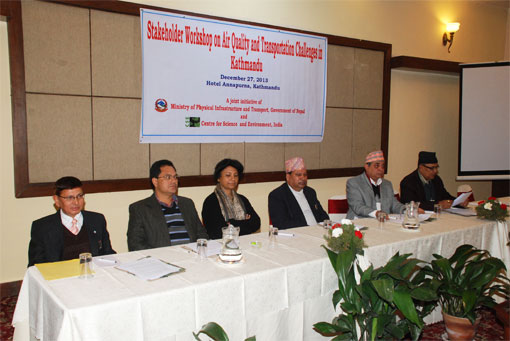Stakeholder Workshop on air quality and transportation challenges in Kathmandu

December 27, 2013 (9.00 am – 4.00 pm)
Kumari Hall, Hotel Annapurna, Durbar Marg, Kathmandu
Centre for Science and Environment (CSE) organised a Stakeholder Workshop on Air quality and transportation challenges in Kathmandu on December 27 in collaboration with Ministry of Physical Infrastructure and Transport, Government of Nepal. This workshop is part of our initiative to build a forum for city dialogue on clean air and sustainable mobility in South Asia. This workshop brought together a wide spectrum of stakeholders including policy makers, academia, experts and civil society groups who are involved with the implementation of the clean air, transportation and mobility related policies in Nepal.
The workshop was inaugurated by Hon. Minister Chhabi Raj Pant, Ministry of Physical Infrastructure and Transport, Government of Nepal. The inaugural session had key note address by Secretary, Ministry of Physical Infrastructure and Transport, Joint Secretary, Ministry of Urban Development and thematic presentation by Executive Director, Centre for Science and Environment. The other speakers and panelists include Joint Secretary, Ministry of Health and Population; Senior Divisional Engineer, Department of Environment, Ministry of Environment, Science and Technology; Senior Divisional Engineer, Department of Roads; Senior Divisional Engineer. Ministry of Physical Infrastructure and Transport; Chairperson, Electric Vehicle Manufacturers’ and Importers Association of Nepal; Chairman, Sajha Yatayat; Regional Technical Advisor, South Asia, UN Habitat; Technical Director, Department of Transport Management; Superintendent of Police, Metropolitan Traffic Police and Project Chief, Kathmandu Metropolitan City.
The discussion focused on air quality and transportation challenges of Kathmandu and solutions to make it a liveable city. The key strategies that were discussed include air quality monitoring and management to protect public health; fuel quality and vehicle emission standards roadmap; electric vehicles; bus transport reforms – revival of Sajha Yatayat; walking and cycling; improved vehicle inspection for reducing emissions; in-use vehicle management and traffic interventions and parking policy as a travel demand management strategy.
CSE flagged off the key concerns for Kathmandu valley and suggested a series of actions -- strengthen air quality monitoring; link import policy with the technology and fuel quality leapfrog to cleaner fuel and vehicle technology and introduce Euro IV fuels nation-wide; scale up and accelerate bus transport reforms, integrate public transport, non-motorised transport and para-transit systems; design pedestrian guidelines for approval of road projects and enhancement of the existing ones; introduce a parking policy as a car restraint measures and to reduce congestion; strengthen emissions checks on in-use vehicles; use tax measures to discourage personal vehicle usage and inefficient use of fuels and ensure well planned, dense and compact city design to reduce travel distances and dependence on personal vehicles.
For details, contact:
Priyanka Chandola
Right To Clean Air Campaign
Centre for Science and Environment
Tel: +91 – 9810414938 (Mobile)
Email: priyanka@cseindia.org
